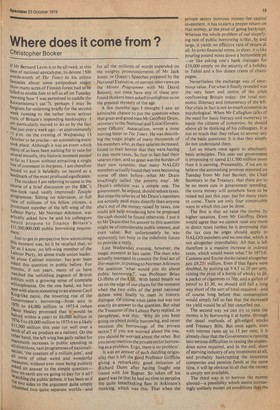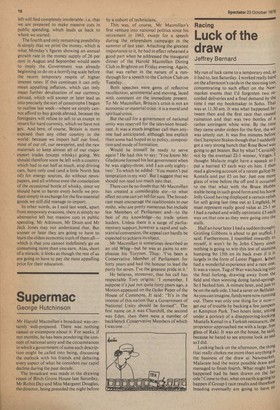Where does it come from ?
Christopher Booker
Mr Bernard Levin is to be all:iwed, at this time of national apocalypse, to devote 1500 words-worth of The Times to his pillow fantasies about some antipodean singer (bow many acres of Finnish forest had to be felled to enable him to tell us all on Tuesday morning how 'I was permitted to cuddle the Kawanissima's cat' ?), perhaps I may be forgiven for returning briefly for the second week running to the rather more serious topic of Britain's impending bankruptcy. I am particularly moved to do so by the fact that just over a week ago—at approximately P.m. on the evening of Wednesday 13 October to be precise—an astonishing event took place. Although it was an event which any of us have been waiting for in vain for several months, this historic moment passed so far as I know without attracting a single line of comment in the press. I am therefore bound to put it belatedly on record as a landmark of the most profound significance.
The incident I am referring to came in the Course of a brief discussion on the BBC's new-look (and vastly improved) Tonight Programme. Sitting on television, in full view of millions of his fellow citizens, a Prominent member of the left wing of the Labour Party, Mr Norman Atkinson, was actuallyasked how he and his colleagues would propose to finance Britain's k 11,500,000,000 public borrowing requirePlent.
Just to get in perspective how astonishing this moment was, let it be recalled that, so far as I know, no left-wing member of the Labour Party, let alone trade union leader, let alone Cabinet minister, has ever been asked this question in public before. For Months, if not years, many of us have watched the unfolding pageant of British Politics with a growing sense of complete schizophrenia. On the one hand, we have s,,een with alarm mounting to an almost Cecil 'ing-like panic, the towering rise of the Government's borrowing—from zero in 1970 to £4,000 million in 1973-4 (when penis Healey promised that it would be "alved within a year) to £6,000 million in 1974-5 to £9,000 million in 1975-6 to a likely f11,500 million this year (or well over a tenth of all we produce as a nation). On the other hand, the left wing has gaily called for hlantmoth increases in public spending in all directions, vast programmes of nat ionalisation, 'the creation of a million jobs', and ail sorts of other weird and wonderful Teasures, without ever once being publicly sked an answer to the simple question— !1.(3w on earth are we going to pay for it all ? tw, atching the public debate, it has been as if .11e two sides to the argument quite simply inhabited two quite separate worlds—and
for all the millions of words expended on the weighty pronouncements of Mr Jack Jones, or Queen's Speeches prepared by the National Executive, or earnest interviews on the Money Programme with Mr David Basnett, not once have any of these profound thinkers been asked to enlighten us on the greatest mystery of the age.
A few months ago I thought I saw an admirable chance to put the question when that great and good man Mr Geoffrey Drain, secretary to the National and Local Government Officers' Association, wrote a most moving letter to The Times. He was describing the tragic plight of many thousands of his members who, as their salaries increased, found to their horror that they were having to pay more taxes. So fast in fact had their salaries risen, and so great was the burden of their new taxation, that many NALGO members actually found they were becoming worse off than before—what Mr Drain touchingly called 'the poverty trap'. Mr Drain's solution was a simple one. The government, he argued, should reduce taxes. But since the salaries of Mr Drain's members are actually paid more directly than anyone else's out of the money raised by taxes, one could not help wondering how he proposed the cash should be found otherwise. 1 put it to Mr Drain that his answer to this question might be of considerable public interest, and even value. But unfortunately he was apparently too busy in the indefinite future to provide a reply.
Last Wednesday evening, however, the magic moment at last came. The man who actually managed to commit the final act of lese-maieste, in Putting to Norman Atkinson the question 'what would you do about public borrowing?', was Professor Brian GI iffiths of the LSE. With bated breath we sat on the edge of our chairs for the moment when the two sides of the great national debate were finally to meet in historic dialogue. Of course what came out was not exactly an answer to the question. But what the Treasurer of the Labour Party replied, in paraphrase, was this: 'Why do you keep going on about public borrowing, and never mention the borrowings of the private sector? If you are worried about the one, you should be worried about the other. But you never mention the private sector borrowing as a problem. Ergo, there is no problem'.
It was an answer of such dazzling originality that it left the good Professor Griffiths giving a remarkably good imitation of Richard Dunn after having fought one round with Joe Bugner. So taken off his guard was he that he had no time to perceive the quite breathtaking flaw in Atkinson's thinking, which was this. That when the
private sector borrows money for capital investment, it has to earn a proper return on that money, at the price of going bankrupt.
Whereas the whole problem of our stupefying rate of public borrowing is that, by and large, it yields no effective rate of return at
all. In strict financial terms, in short, it is like pouring pound notes down a bottomless pit
—or like asking one's bank manager for £10,000 simply on the security of a holiday in Tahiti and a few dozen crates of champagne.
Nevertheless the exchange was of enormous value. For what it finally revealed was the very heart and centre of the crisis confronting Britain today : the total economic illiteracy and innumeracy of the left. Our crisis in fact is not so much economic as psychological. When Mr Callaghan talks of the need for basic literacy and numeracy to equip the citizens of tomorrow, he should above all be thinking of his colleagues. It is not so much that they refuse to answer any of the basic questions. It is that they simply do not understand them.
Let us return once again to absolutely basic principles. This year our government is proposing to spend £11,500 million more than it is earning. Presumably, if we are to believe the astonishing promise reported on Tuesday from Mr Joel Barnett, the Chief Secretary to the Treasury, that there are to be no more cuts in government spending, the extra money will somehow have to be raised not just this year, but for many years to come. There are only four conceivable ways in which this can be done.
The first is that we raise the money by higher taxation. Even Mr Geoffrey Drain would agree that we cannot raise any more in direct taxes (unless he is proposing that the tax cuts he urges should apply to NALGO members and no one else, which is not altogether improbable). All that is left therefore is a massive increase in indirect taxes, which would mean what ? In 1975-6, Customs and Excise duties raised altogether just £9,251 million. Even if that figure were doubled, by putting up VAT to 20 per cent, raising the price of a bottle of whisky to £6, a packet of cigarettes to 70p, and a gallon of petrol to £1.30, we should still fall a long way short of the sort of total required—and of course long before that consumption would simply fall so fast that the increased tax yield would be all but cancelled out.
The second way we can try to raise the money is by borrowing it at home, through the usual methods of gilt-edged stocks and Treasury Bills. But once again, even with interest rates up to 15 per cent, it is already clear that the Government is running into serious difficulties in raising the stupendous sums required, and in the end, short of starving industry of any investment at all, and probably bankrupting the insurance companies and pension funds at the same time, it will be obvious to all that the money is simply not available.
The third way is to borrow the money abroad—a possibility which seems increasingly unlikely except on conditions that the left will find completely intolerable: i.e. that we are prepared to make massive cuts in public spending, which leads us back to where we started.
The fourth and only remaining possibility is simply that we print the money, which is what Monday's figures showing an annual growth rate in the money supply of 26 per cent in August and September would seem to imply the Government was already beginning to do on a horrifying scale before the recent temporary respite of higher interest rates. If this continues it can only mean appalling inflation, which can only mean further devaluation of our currency abroad, which will sooner or later lead us into precisely the sort of catastrophe I began to outline last week—where we simply cannot afford to buy goods abroad, because the foreigners will refuse to sell to us except in return for hard currency, which we have not got. And here, of course, Britain is more exposed than any other country in the world : because we import half our food, most of our oil, our newsprint, and the raw materials to keep almost all of our major export trades (except whisky) going. We should therefore soon be left with a country which had to eat half as much, stop driving cars, burn only coal (and a little North Sea oil) for energy sources, do without newspapers, and all without even the consolation of the occasional bottle of whisky, since we should have to barter every bottle we produce simply in exchange for the few essential goods we still did manage to import.
In other words, as 1 said last week, apart from temporary evasions, there is simply no alternative left but massive cuts in public spending. Mr Atkinson, Mr Drain and Mr Jack Jones may not understand that. But sooner or later they are going to have to learn the oldest economic truth of them all— which is that you cannot indefinitely go on consuming more than you earn. Alas, short of a miracle, it looks as though the rest of us are going to have to pay the most appalling price for their education.











































 Previous page
Previous page